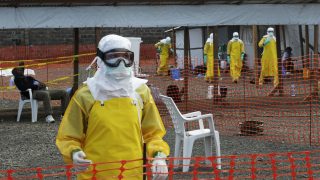On Friday, June 14, 2019, the World Health Organization declared for the third time that the Ebola outbreak in the Democratic Republic of the Congo does not constitute a Public Health Emergency of International Concern (PHEIC) despite its spread to Uganda this week. The declaration was made at the meeting of the Emergency Committee, a panel of 13 independent medical experts convened by the WHO Director-General under the International Health Regulations (IHR) (2005).
According to a news release by the WHO, the Committee extensively debated the impact of declaring a PHEIC and considered possible unintended consequences including economic harm. However, the Committee did acknowledge that the recent cases in Uganda constitute an international spread of the disease. Still, it concluded that the outbreak is a health emergency only in the DRC and neighbouring region but does not meet all three criteria for a PHEIC under the IHR.
“This is not a global emergency, it is an emergency in the Democratic Republic of Congo, a severe emergency and it may affect neighbouring counties. It was the view of the Committee that there is really nothing to gain by declaring a PHEIC, but there is potentially a lot to lose,” Dr Preben Aavitsland, the acting chair of the Committee told a news conference at the U.N. agency’s headquarters in Geneva.
The decision of the WHO to not declare a PHEIC is facing criticism from various public health experts as it brings the event of the 2014 Ebola outbreak to mind. Back then, the WHO was criticised for delaying a PHEIC declaration in West Africa. If the situation in DRC and most recently, Uganda, spirals out of control as it did five years ago, what is to be said of the credibility of the global organization? The clamour for the declaration of a PHEIC also rests on the fact that it will boost public health measures, international funding and resources, all of which the DRC outbreak desperately needs.
Meanwhile, in the absence of a PHEIC declaration, the Committee has provided a list of public health advice it strongly urges countries and responding partners to heed while the current situation is being monitored closely:
- At-risk countries should improve their preparedness for detecting and managing exported cases, as Uganda has done.
- Cross-border screening in DRC should continue and its quality improved and sustained.
- Continue to map population movements and sociological patterns that can predict the risk of disease spread.
- All priority countries should put in place approvals for investigational medicines and vaccines as an immediate priority for preparedness.
- Optimal vaccine strategies that have maximum impact on curtailing the outbreak, as recommended by WHO’s Strategic Advisory Group of Experts (SAGE), should be implemented rapidly.
- The Committee is deeply disappointed that the WHO and the affected countries have not received the funding and resources needed for this outbreak. The international community must step up funding and support strengthening of preparedness and response in DRC and neighbouring countries.
- Continue to strengthen community awareness, engagement, and participation. There has been a great deal of progress in community engagement activities. However, in border communities, where mobility is especially likely, community engagement needs to be more sharply targeted to identify the populations most at risk.
- The implementation by the UN and partners of more coordinated measures to reduce security threats, mitigate security risks, and create an enabling environment for public health operations is welcomed and encouraged by the Committee as an essential platform for accelerating disease-control efforts.
- The Committee strongly emphasizes its previous advice against the application of any international travel or trade restrictions.
- The Committee does not consider entry screening at airports or other ports of entry to be necessary.








